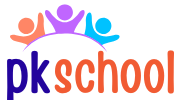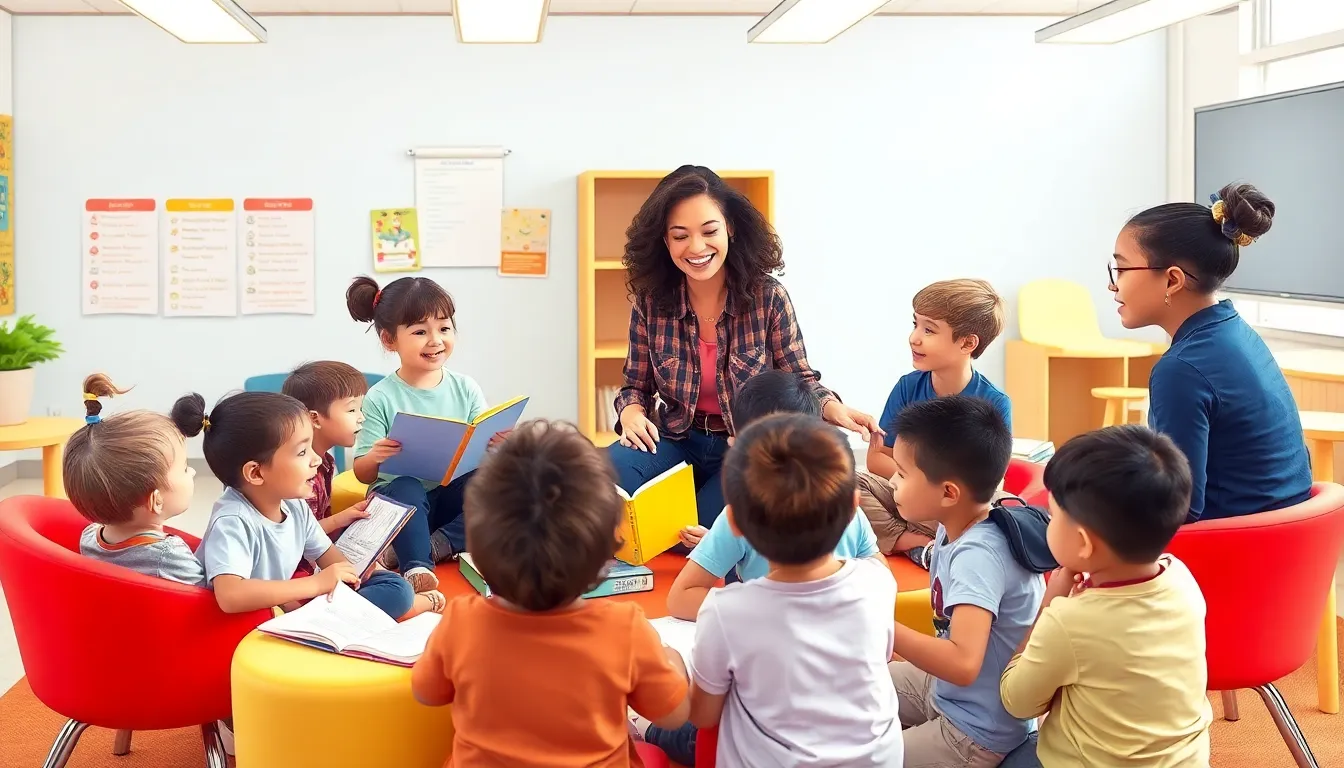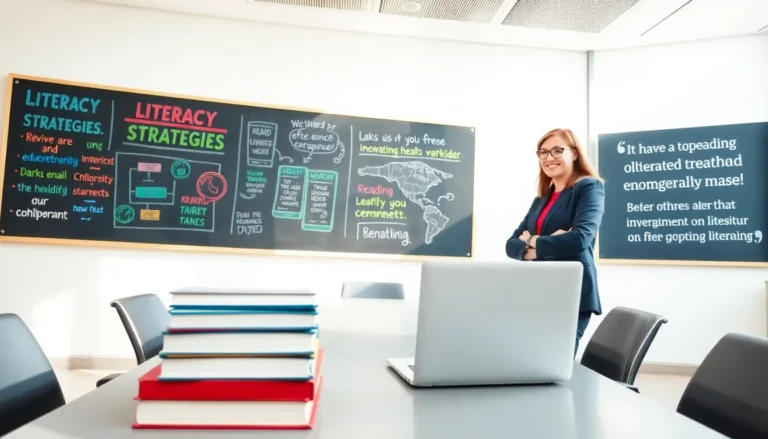Imagine a world where reading isn’t just a chore but an adventure waiting to unfold. Welcome to the reading workshop, where pages come alive and imaginations soar. It’s not your typical sit-and-read routine; it’s a dynamic space that transforms reluctant readers into enthusiastic bookworms.
Table of Contents
ToggleOverview of Reading Workshop
Reading workshops create an engaging environment focused on enhancing students’ reading skills. Designed for various grade levels, these workshops encourage students to explore diverse genres, fostering a love for literature. Instruction integrates mini-lessons with independent reading time, allowing students to practice new strategies in real-time.
Teachers play a crucial role in the reading workshop. They provide guidance, support, and tailored feedback to meet individual student needs. Regular check-ins ensure students remain motivated and accountable for their reading progress. Routine book discussions enhance comprehension skills by inviting students to share thoughts on themes, characters, and plots.
Flexible seating arrangements support comfort and collaboration among readers. Students often engage in peer discussions, cultivating a sense of community within the workshop. Guided reading groups focus on specific skills, allowing targeted instruction for varying reading levels.
Additionally, incorporating choice into reading selection fuels students’ interests. Access to a rich classroom library, filled with high-quality texts and age-appropriate materials, further stimulates exploration. Students are more likely to enjoy reading when they choose their reading materials.
Assessment strategies in the reading workshop measure growth and proficiency. Observational assessments, reading logs, and informal discussions provide insights into each student’s development. Data collected informs future instruction and identifies areas for improvement.
Ultimately, a reading workshop nurtures a culture of literacy that extends beyond the classroom. By instilling a love for reading, students develop lifelong skills applicable to various aspects of life.
Benefits of Reading Workshop

Reading workshops provide numerous advantages, particularly in developing literacy skills and increasing student enthusiasm for reading.
Enhanced Reading Skills
Students experience improved reading skills due to targeted instruction. Mini-lessons focus on specific strategies, enabling students to practice these techniques during independent reading time. Regular book discussions strengthen comprehension as learners analyze themes and character development together. Teachers assess reading progress through observations, ensuring each student receives personalized feedback. Engaging with diverse genres encourages exploration and strengthens adaptability in reading. Additionally, guided reading groups cater to various proficiency levels, enhancing overall reading abilities and fostering a supportive learning environment.
Increased Student Engagement
Student engagement rises significantly in reading workshops. A flexible seating arrangement promotes comfort and collaboration among peers. Choice in reading materials sparks interest and motivates students to explore new topics. Participants actively contribute to discussions, creating a vibrant community atmosphere. Regular check-ins from teachers keep students accountable, fueling motivation and a sense of achievement. The lively environment transforms reading from a chore into an enjoyable experience. Encouraging these interactions builds excitement, which leads to increased participation and a deeper love for literature.
Components of a Reading Workshop
Reading workshops consist of essential elements that create an engaging and transformative experience for students. Each component plays a crucial role in developing literacy skills and fostering a love for reading.
Mini-Lesson
Mini-lessons serve as brief, focused segments that introduce specific reading strategies or concepts. Teachers deliver these lessons using direct instruction tailored to students’ needs. By incorporating modeling, teachers demonstrate effective techniques for comprehension, prediction, and analysis. Engaging students during these lessons enhances their understanding of texts. For instance, utilizing mentor texts can illustrate diverse genres and styles. The goal becomes clear: equip students with skills they can apply during independent reading.
Independent Reading
Independent reading allows students to explore texts of their choice. This component encourages them to engage with materials that resonate with their interests and preferences. Teachers create a vibrant classroom library, including a wide range of genres, authors, and formats. Allocating specific time for reading promotes sustained focus and enjoyment. Students practice effective strategies learned in mini-lessons, enhancing their ability to tackle challenging material. Observations during this time inform teachers about student progress and areas needing support.
Sharing Time
Sharing time facilitates peer interaction and discussion about texts. Students express their thoughts, insights, and questions regarding their reading experiences. This collaborative approach fosters comprehension and critical thinking. Teachers guide discussions, steering conversations to address themes, characters, or plot developments. By presenting ideas in a supportive environment, students build confidence in their voices. Engaging with peers enriches the reading experience and creates a sense of community within the workshop.
Best Practices for Implementing Reading Workshop
Establishing a reading workshop requires thoughtful planning and execution. Integrating mini-lessons ensures students gain essential reading strategies. These lessons focus on comprehension skills, enabling students to analyze texts effectively.
Cultivating a rich selection of diverse reading materials sparks interest among students. Students choose books that resonate with them, which fosters a sense of ownership in their reading journey. Encouraging independent reading cultivates a love for literature and enhances fluency through practice.
Creating a nurturing environment promotes collaboration and open dialogue. Students thrive in flexible seating arrangements that cater to their comfort, allowing them to discuss and share insights with their peers. Regular book discussions enhance critical thinking as students articulate their opinions on themes and character motivations.
Holding guided reading groups provides targeted instruction tailored to individual reading levels. These small group sessions allow educators to offer personalized strategies, ensuring all students progress according to their unique needs. Feedback collected during these sessions helps adjust instruction as necessary.
Incorporating routine check-ins maintains student motivation and accountability. Frequent assessments through observations verify students’ understanding and reading growth. Monitoring progress aids in adapting teaching methods, thus maximizing the effectiveness of the workshop.
Creating a community of enthusiastic readers reinforces a culture of literacy. Structured sharing time provides an avenue for students to express their thoughts while building confidence in their voice. Connecting with others fosters camaraderie and enriches the reading experience, making it a shared adventure.
The reading workshop stands as a transformative approach to fostering a love for literature among students. By creating an engaging and supportive environment, it empowers young readers to explore diverse genres and develop essential literacy skills. Through tailored instruction and meaningful discussions, students not only enhance their comprehension but also build a sense of community.
Teachers play a pivotal role in this process by guiding students and providing personalized feedback. The combination of independent reading and collaborative sharing allows for a dynamic learning experience that extends beyond traditional methods. Ultimately, the reading workshop cultivates enthusiastic readers who view literature as an adventure, enriching their academic journey and personal growth.



